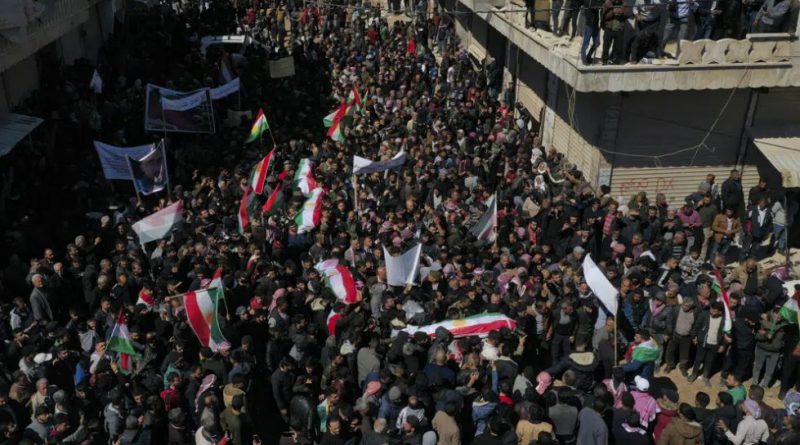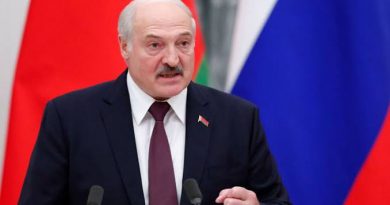Killing of Kurds in northern Syria sparks protests, tensions
Jinderis (AP) — Thousands of Kurds took to the streets of the earthquake-ravaged Syrian town of Jinderis on Tuesday to protest the killing of four men as they lit a fire to celebrate the Kurdish new year the night before.
The attack on the Kurdish men rekindled tensions between Turkish-backed armed groups controlling the area and Kurdish residents. It fed into a power struggle between rival armed factions that control different parts of northwest Syria.
At the request of Kurdish residents, fighters from the armed opposition group Hayat Tahrir al-Sham deployed en masse around Jinderis on Tuesday. The Syrian Observatory for Human Rights, an opposition war monitor, reported that the group had taken over the headquarters of the Ahrar Sharqiya group, a Turkish-backed armed opposition group, in the area.
A HTS spokesperson declined to comment on the matter, but there was a heavy presence of the group’s fighters in and around the city as crowds of Kurds attended the funerals of the victims. Meanwhile, Turkish forces deployed on the road linking the town of Atmeh, controlled by HTS, with Jinderis.
The assailants who shot the Kurdish men as they were lighting a fire in celebration of the Nowruz holiday allegedly belonged to Jaish al-Sharqiya, a splinter group of Ahrar Sharqiya.
The Syrian National Army, an alliance of the various Turkish-backed factions in the area, issued a statement condemning the killing of the Kurdish men in “the strongest possible terms” and promising to bring the perpetrators to justice.
Tuesday evening, an official with the Harakat al-Tahrir wa al-Binaa, a faction within the Syrian National Army, announced that the suspects in the killing had been arrested and promised that local authorities will “deal firmly and forcefully with all perpetrators of crimes and violations against innocent people.”
Jinderis was controlled by Kurdish fighters until 2018 when it was taken by Turkey-backed opposition fighters who still hold it. The capture of the town displaced many Kurds, while those who remained complain that they are often mistreated and subjected to discrimination.
“We call for an end to these violations and an end to the demographic change,” said Zakaria Ali, one of the Kurdish protesters. “All the Syrian people are our brothers, but criminals are not.”
In the hours after the shooting, some Kurds from Jinderis traveled in a convoy to the town of Atmeh, about 9 miles (15 kilometers) away, where they called on HTS to seize control of Jinderis from the Turkish-backed militias.
While Hayat Tahrir al-Sham is designated as a terrorist group by the U.S. and other Western countries due to its historical ties with al-Qaida, many Kurdish residents of the area said they see it as preferable to the Turkish-backed groups.
HTS leader Abu Mohammed al-Golani met with a group of the victims’ families late Monday evening and promised revenge.
“The ones who harmed you will be killed, God willing,” Golani told the group.
Clashes between Turkey-backed opposition gunmen and Kurdish fighters have left scores of people dead on both sides in Syria.
Since 2016, Turkey has launched three major operations inside Syria, targeting Syria’s main Kurdish militia — the People’s Protection Units or YPG — which Turkey considers a terrorist organization and an extension of the outlawed Kurdistan Workers’ Party, or PKK. The PKK has for decades waged an insurgency within Turkey against the government in Ankara.
The YPG, however, forms the backbone of U.S.-led forces in the fight against Islamic State militants and has been a top U.S. ally in Syria.



